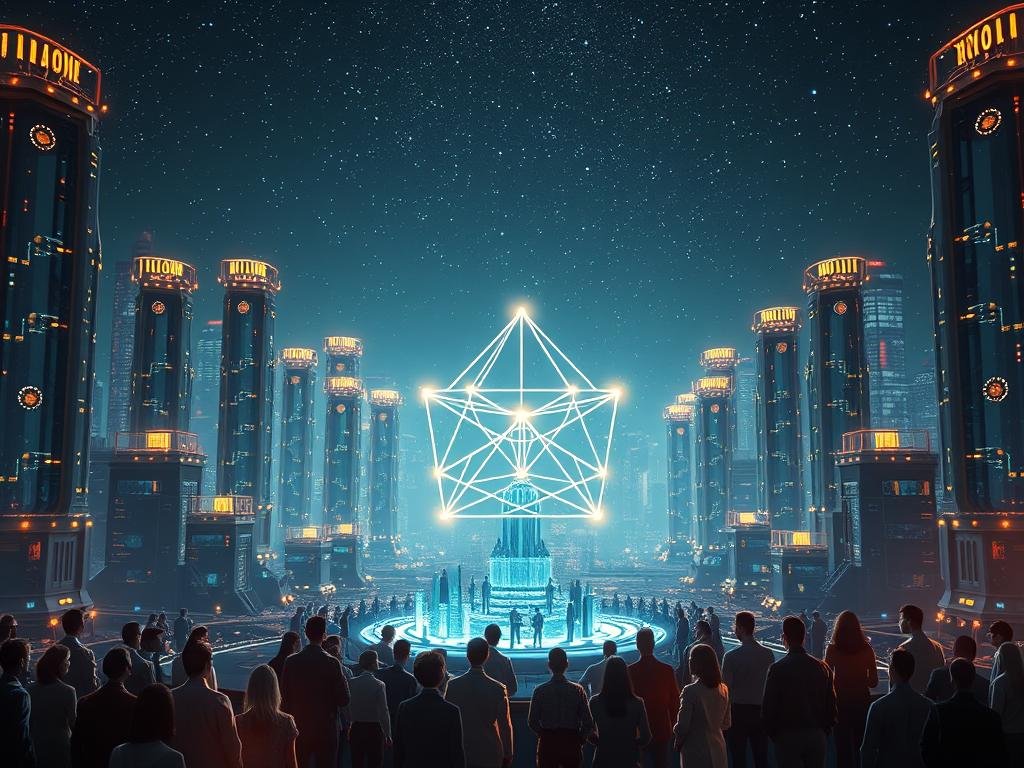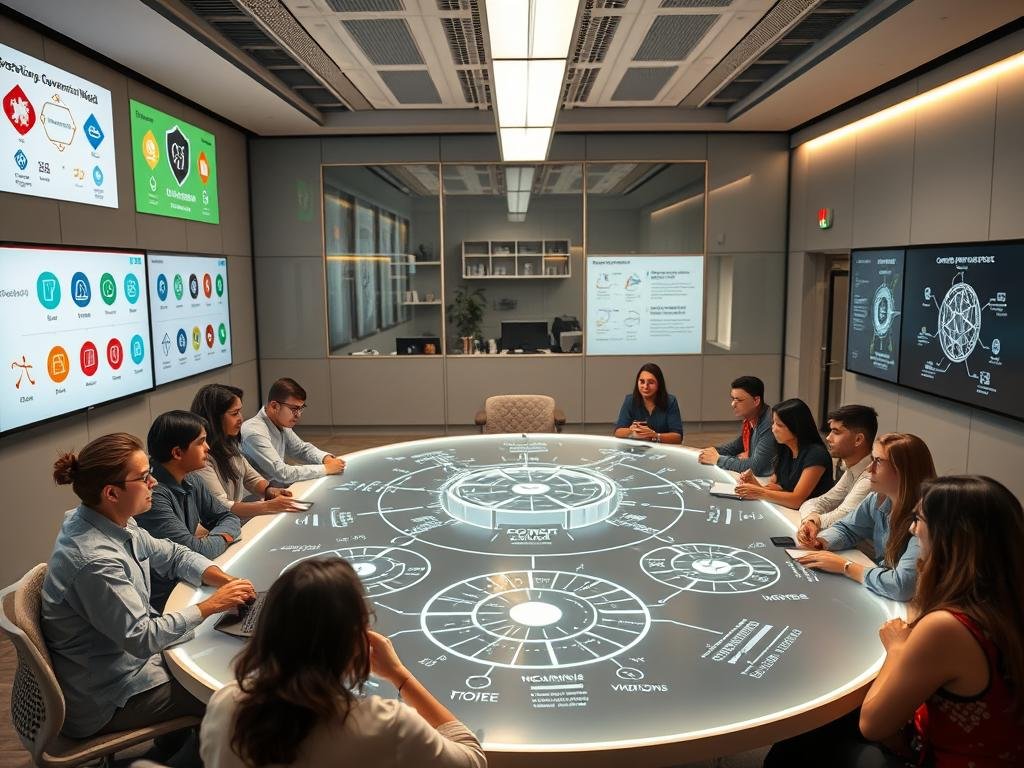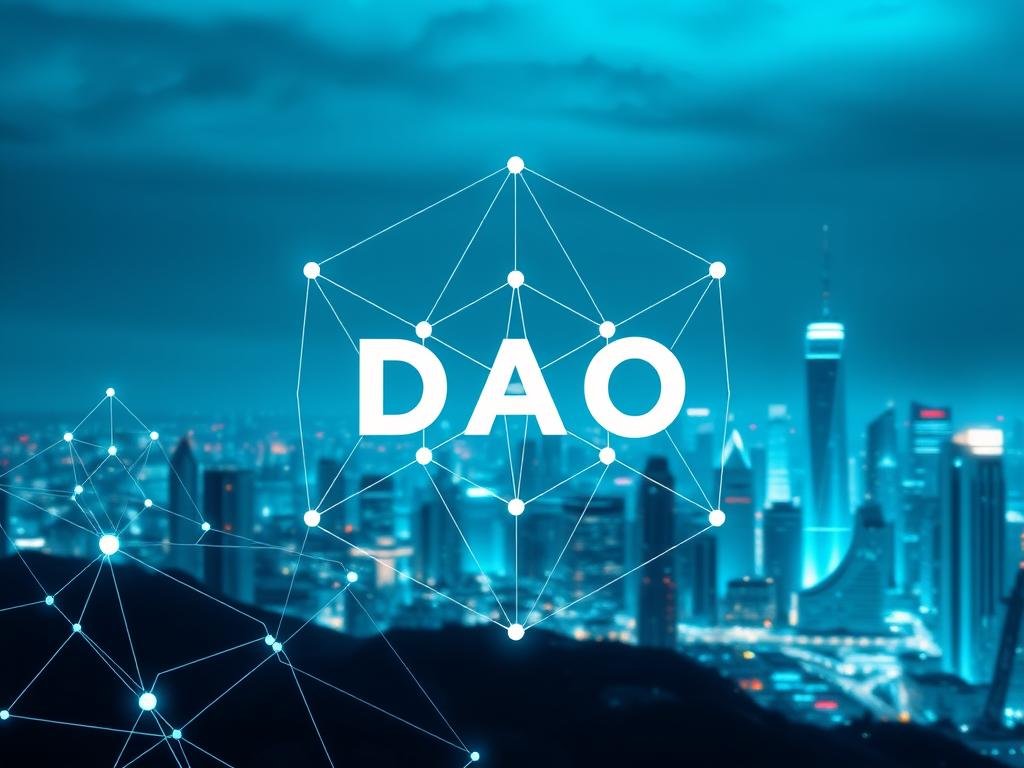In 2021, the value locked in decentralized finance (DeFi) reached $180 billion. This shows how fast decentralized systems are growing. Decentralized Autonomous Organizations (DAOs) lead this change. They turn old, top-down systems into new, fair, and open ones.
Thanks to blockchain technology, DAOs let people join in governance without middlemen. This makes the system more open and clear. As you learn about DAOs, you’ll see how they change power, like Web3 does in its real use cases.
Key Takeaways
- Decentralized Autonomous Organizations (DAOs) are changing how we govern.
- DAOs use blockchain for fair decision-making.
- The growth of DAOs is part of the DeFi movement.
- DAOs make governance more open and fair.
- The rise of DAOs is changing power in many fields.
Understanding DAO Governance
Have you ever wondered how decentralized autonomous organizations change traditional ways of making decisions? DAO governance is a big change. It makes decision-making more open and shared among everyone.
Definition and Core Principles
A DAO, or decentralized autonomous organization, is a new way to run things on the blockchain. It lets online communities work together, fund projects, and manage things without a CEO or old-fashioned hierarchy. The main idea of DAO governance is decentralized decision making. This means everyone gets to vote and decisions are made by code, making everything clear and open.
At its core, DAO management uses smart contract governance. This means rules and decisions are written in smart contracts. These contracts make sure things run smoothly and follow the rules set by the DAO.
Key Characteristics of DAOs
DAOs have some key features that set them apart from traditional groups. These include:
- Decentralized governance structure
- Use of smart contracts for decision enforcement
- Collective decision-making processes
- Transparency in operations and decision-making
These traits help us understand how DAOs work and how they’re different from old-fashioned groups.
Differences from Traditional Organizations
One big difference between DAOs and traditional groups is how they make decisions. Traditional groups usually have a top-down structure, with a few people or a board making the calls. DAOs, on the other hand, spread decision-making power among their members. They use decentralized decision making to make things fair and open.
| Characteristics | DAOs | Traditional Organizations |
|---|---|---|
| Governance Structure | Decentralized | Centralized |
| Decision Making | Collective, enforced by smart contracts | Hierarchical, based on individual or board decisions |
| Transparency | High, due to blockchain technology | Varies, often less transparent |
Vitalik Buterin, co-founder of Ethereum, said, “DAOs represent a new way of governing, one that’s more open and doesn’t rely on trusting individuals.” This shows how DAOs could change the way we govern organizations.
“The beauty of DAOs lies in their ability to create a trustless system where decisions are made and enforced automatically, without the need for intermediaries.”
The Rise of Decentralized Autonomous Organizations
DAOs have changed a lot from when they first started. They’ve changed how we think about running organizations. Exploring DAOs shows how they’ve changed traditional ways of organizing.

Historical Context of DAOs
The first DAO, called The DAO, started in 2016. It was a decentralized fund on Ethereum. It raised over $150 million, a big deal at the time.
But, a bug in the code led to a loss of about $60 million. This made people talk a lot about security and how to govern DAOs.
This event showed how important strong security is for DAOs. Even with the setback, DAOs kept growing. Many projects learned from The DAO’s mistakes.
Major Milestones in DAO Development
There have been key moments in DAO history:
- The DAO framework was set up on Ethereum, leading to many DAOs.
- New ways of making decisions, like token-based governance, were developed.
- More focus on security checks and bug rewards to prevent problems.
DAOs have grown with new ideas in governance and security. As they get better, we’ll see even stronger DAOs.
Case Studies of Notable DAOs
Some DAOs have really helped the community. For example, MakerDAO has led in using decentralized governance for the DAI stablecoin.
“The MakerDAO governance model has shown that decentralized decision-making can be effective and robust.”
Aragon and Uniswap are also notable. They show DAOs can work in different areas, like governance and DeFi.
Looking into these DAOs gives us a good idea of what they can do. It shows both the challenges and the chances they offer.
The Technology Behind DAOs
Understanding DAOs’ technology is key to seeing how they can change traditional groups. At their core, DAOs use smart contracts and blockchain technology. These tools help make governance decentralized.
Smart Contracts: The Backbone of DAOs
Smart contracts are vital for DAOs. They make sure rules are followed and decisions are made. These contracts run on code, making decisions automatic.
For example, a DAO might use a smart contract to handle its money. Decisions on how to spend funds are based on rules and votes. This makes things clear and cuts down on mistakes or cheating.
“Smart contracts are a key part of DAOs. They help make complex decisions clear and safe from tampering.”
Blockchain Technology and Its Role
Blockchain is the base of DAOs. It’s a secure, shared record of all actions and decisions. This keeps the DAO’s history safe and open.
Blockchain also makes governance tokens possible. These tokens let members vote on big decisions. The more tokens someone has, the more say they have in voting.
| Feature | Blockchain Technology | Traditional Databases |
|---|---|---|
| Decentralization | Decentralized, distributed ledger | Centralized control |
| Immutability | Immutable records | Mutable records |
| Transparency | Transparent transactions | Variable transparency |
Consensus Mechanisms in DAO Governance
Consensus mechanisms are key in DAOs. They make sure most members agree on decisions. Methods like proof of stake (PoS) and delegated proof of stake (DPoS) keep the network safe and transactions valid.
For more on DAOs and their tech, check out Investopedia’s guide on DAOs. It offers a detailed look at the topic.
In summary, DAOs work thanks to smart contracts and blockchain. As these technologies grow, we’ll see more changes in how DAOs are run.
Benefits of DAO Governance
DAO governance offers many benefits, like more transparency and better participation. These advantages are real and happening in the world of decentralized autonomous organizations.
Increased Transparency and Trust
One big plus of DAO governance is how transparent it is. Every transaction and decision is recorded on the blockchain, making everything open and secure. This openness builds trust among members, as they can see that decisions follow the rules.
Blockchain technology makes sure decisions can’t be changed once made. This immutability is key to trust, showing that decisions are fair and unbiased.
Enhanced Participation and Inclusivity
DAO governance makes it easy for people worldwide to help make decisions. With decentralized decision making, everyone gets a say through the DAO voting mechanism. This way, every member’s voice is heard.
- Members vote directly, without needing others to do it for them.
- The DAO voting mechanism makes sure votes are counted right and openly.
- It doesn’t matter where you are in the world, you can participate.
Flexibility and Adaptability in Decision-Making
DAOs are built to be flexible and quick to adapt. This agile decision-making is key in a fast-changing world. Being able to adjust fast can give a big edge.

Smart contracts help make DAO governance flexible. They can make decisions automatically when certain things happen. This makes decisions faster and less prone to mistakes.
Challenges Faced by DAOs
DAOs have a lot to overcome to succeed. It’s important to know these challenges to understand the complexity of managing DAOs.
Legal and Regulatory Hurdles
DAOs struggle with the legal and regulatory world. Without clear rules, they find it hard to follow laws. This could lead to legal trouble. For example, the challenges in DAO governance article talks about the unclear rules for DAOs.
Key Legal Challenges:
- Unclear jurisdictional authority
- Compliance with existing financial regulations
- Taxation implications for DAO activities
Security Concerns and Hacks
Security is a big worry for DAOs. Smart contracts and blockchain are secure but can be hacked. Hacks can cause big financial losses. It’s good to know about the steps being taken to improve security, like:
| Security Measure | Description | Benefits |
|---|---|---|
| Smart Contract Audits | Thorough review of smart contract code | Identifies vulnerabilities before deployment |
| Multi-Signature Wallets | Requires multiple approvals for transactions | Reduces risk of unauthorized transactions |
Governance Token Dynamics
Governance tokens are key to DAOs. How these tokens are distributed and managed affects decision-making. It’s important to understand how they work and their impact:
Token Concentration: If a few people have most of the tokens, it can lead to control by a few. This goes against the decentralized idea of DAOs.
As DAOs grow, tackling these challenges is vital for their success. Knowing about legal, security, and governance issues helps us see the efforts to overcome them. It also shows us the future of DAO management.
Various Governance Models in DAOs
DAOs have many governance structures, from token-based to liquid democracy. This variety lets DAOs try out different ways to make decisions. Each method has its own good points and challenges.
Token-Based Governance
Token-based governance is common in DAOs. It gives voting power based on how many tokens a member has. This system is easy to understand and makes sure members want the DAO to succeed.
Advantages: Easy to set up, matches member interests with DAO goals.
Disadvantages: Can create a situation where a few with lots of tokens control too much.
Liquid Democracy Models
Liquid democracy mixes direct and representative democracy. Members can vote directly or give their vote to someone they trust. This model is flexible and can lead to better decisions.
“Liquid democracy allows for a more nuanced approach to governance, enabling members to participate directly or delegate their votes as they see fit.”
Key Features:
- Flexibility in voting options
- Potential for more informed decisions through delegation
- Encourages active participation
Multisignature Wallets and Their Role
Multisignature wallets need more than one signature to approve a transaction. This makes things safer and helps with DAO governance. It ensures big decisions are made together.

| Governance Model | Description | Key Benefits |
|---|---|---|
| Token-Based | Voting power based on token holdings | Simple, aligns interests |
| Liquid Democracy | Combines direct and representative democracy | Flexible, informed decisions |
| Multisignature Wallets | Requires multiple approvals for transactions | Enhanced security, collective decision-making |
By using these governance models, DAOs can build systems that work well. These systems are strong and can change as needed.
The Role of Community in DAOs
In the world of Decentralized Autonomous Organizations, community is key. A strong, active community is the base for DAO success.
Building a Strong Community Engagement
Creating a strong community is more than just a forum or social media group. It needs active engagement and inclusive decision-making. Encourage participation with events, AMAs, and rewards for contributions.
Use platforms like DAO community forums for discussions and feedback. This builds belonging and ensures voices are heard in governance.
Importance of Communication Channels
Good communication is vital for a DAO’s success. You must have clear and transparent channels for updates and decisions. Use social media, forums, and reports for this.
Open communication builds trust and makes members feel valued. This leads to a more active and engaged community.
Conflict Resolution Mechanisms
Conflicts can happen in any community, including DAOs. You need robust conflict resolution to handle disputes fairly. This could be through mediation, voting, or other methods.
Clear conflict resolution keeps your community harmonious. This ensures the DAO runs smoothly, even with disagreements.
Successful Examples of DAO Governance
DAOs like MakerDAO, Aragon, and Uniswap are changing the blockchain world. They show how DAOs can work well in different areas, like stablecoins and exchanges.

MakerDAO: A Pioneer in the Space
MakerDAO is a top DAO example. It manages the Maker Protocol, which lets users create and handle the DAI stablecoin. MakerDAO’s governance model uses the MKR token for decision-making. This way, the protocol is managed efficiently and transparently.
Its success comes from a strong governance setup. This includes a decentralized way of making decisions. For more on DAOs, check out top DAO use cases.
Aragon: Promoting Decentralized Governance
Aragon is another key DAO. It helps create and manage decentralized organizations. Aragon’s governance relies on the ANT token for voting on proposals.
Aragon is known for being easy to use and flexible. Its modular framework lets organizations tailor their governance to fit their needs.
Uniswap: Token Holder Influence
Uniswap is a top decentralized exchange (DEX) run by a DAO. The Uniswap DAO lets UNI token holders vote on proposals. This ensures the protocol grows in a community-driven way.
Uniswap’s governance has helped it stay ahead in the DEX market. Efficient decision-making has kept it a leader.
Future Trends in DAO Governance
DAO governance is on the verge of a big change. This change comes from new tech and community ideas. We need to look at what will shape these decentralized groups.
Growth Predictions
DAOs are growing, and they will be used in more areas. Industry forecasts say the DAO market will grow a lot. This is because of more transparency and more people involved.
“The future of DAOs is not just about growing,” says a top expert. “It’s about making governance better and stronger.”
Integration with Traditional Institutions
DAOs might work with old institutions in the future. This could lead to new ways of governing that mix the best of both worlds.
This mix could make DAOs more credible. It could also give them more resources and knowledge.
Evolving Governance Frameworks
As DAOs grow, their rules will change a lot. The future looks bright for sophisticated governance models. These will use new tech like AI to make better decisions.
- Enhanced security measures
- More inclusive participation mechanisms
- Adaptive governance structures
New frameworks will help DAOs deal with problems like security and rules. They are key to making DAOs work better.
DAO Governance in Different Industries
DAOs are changing many industries, making old ways of doing things obsolete. This section looks at how DAO governance is used in finance, gaming, and social networks.
Financial Services and DeFi
The finance world, and DeFi in particular, is embracing DAO governance. DAO governance models help manage protocols, decide on assets, and guide DeFi project growth.
Key Applications in DeFi:
- Protocol management
- Asset allocation
- Project development oversight
| DeFi Project | DAO Governance Feature | Benefit |
|---|---|---|
| MakerDAO | Decentralized decision-making | Increased transparency and community involvement |
| Uniswap | Token holder voting | Enhanced community participation |
| Compound | Governance token dynamics | Flexible and adaptive decision-making |
Gaming and NFTs
The gaming world is using DAO governance to make games more community-focused, thanks to NFTs. DAOs help manage NFT markets, decide on game updates, and oversee community resources.
Key Applications in Gaming:
- NFT marketplace governance
- Game development decisions
- Community resource management
Social Networks and Content Creation
DAO governance is also being tested in social networks and content platforms. It makes these platforms more community-driven, letting users influence content and platform updates.
Potential Benefits:
- Increased user engagement
- Decentralized content moderation
- Community-driven platform development
In conclusion, DAO governance is changing many industries. It brings new ways for communities to make decisions and get involved. As DAOs grow, we’ll see more new ideas and challenges in each field.
Regulatory Developments Impacting DAOs
Regulatory changes are key in shaping DAOs’ future. Governments and institutions are figuring out how to handle them. It’s important to look at the current rules and how they affect DAOs.
Current Legislation Affecting DAOs
The laws for DAOs vary a lot around the world. In the U.S., DAOs face a mix of federal and state rules. Securities laws are important because they might apply to DAOs that issue certain tokens or coins.
Some places, like Malta, are making laws for DAOs. Malta has rules for blockchain and DLT, including DAOs. Knowing these rules is key for DAOs working worldwide.
Potential Future Regulations
As DAOs grow, new rules might come. These could make DAOs more open and protect investors better. For example, DAOs might have to share more about how they work and their money.
Comparing International Approaches to DAO Governance
Each country has its own way of handling DAOs. The United States focuses on securities laws. But Switzerland looks at blockchain and DLT in a broader way.
Looking at how different countries handle DAOs can help. It shows how to deal with rules in various places. This helps DAOs work well globally.
Conclusion: The Future of Power with DAO Governance
As you look into Decentralized Autonomous Organizations (DAOs), it’s clear they’re changing how power is shared. DAOs bring a more democratic, open, and spread-out way of running things. They could change how we see power and efficiency in organizations.
Key Takeaways
DAOs’ governance models will need to grow to handle more people and tasks. There’s no one-size-fits-all solution; each DAO needs its own approach. For more on dealing with decentralized decision-making, check out this in-depth analysis.
Embracing the Shift
It’s important to adapt as DAOs change the game of power. By grasping the benefits of DAO governance, you can lead in this new era. DAOs are at the forefront of a more open and decentralized future.
FAQ
What is a DAO, and how does it differ from traditional organizations?
A Decentralized Autonomous Organization (DAO) runs on a blockchain network. It makes decisions through smart contracts. Unlike old organizations, DAOs are open, self-governing, and run by the community. Decisions are made by those who hold tokens.
How do DAOs achieve decentralized governance?
DAOs use blockchain, smart contracts, and consensus to govern. These tools help make decisions safely, openly, and with community input. This way, everyone who holds tokens can help decide.
What are the benefits of DAO governance?
DAO governance brings more openness, more people involved, and flexible decision-making. It also builds trust and accountability within the community.
What are some challenges faced by DAOs?
DAOs struggle with legal issues, security, and how tokens work. These problems can affect their success. They need careful planning and solutions.
How do DAOs use smart contracts?
Smart contracts are the core of DAOs. They automate decisions and carry out community choices. This makes governance secure, clear, and efficient.
What is the role of community in DAOs?
The community is key in DAOs. It drives decisions, participation, and governance. Building a strong community is vital for DAO success, needing good communication and ways to solve conflicts.
What are some successful examples of DAO governance?
MakerDAO, Aragon, and Uniswap are examples of DAO success. They show good governance, community involvement, and decision-making. These cases highlight DAOs’ promise in different fields.
How might DAOs evolve in the future?
DAOs will grow, work with traditional systems, and develop new governance models. As they evolve, they’ll play a big role in shaping governance and power.
What are the legal implications for DAOs?
DAOs face a complex legal landscape, with different rules around the world. It’s important for DAOs to understand these laws to comply and operate smoothly.
How can DAOs be applied in different industries?
DAOs can change many sectors, like finance, gaming, and social networks. They bring decentralized governance, community involvement, and innovation. DAOs can disrupt and grow in many areas.
